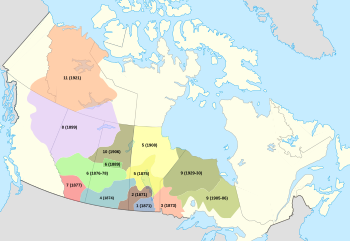Numbered Treaties

Map of Numbered Treaties of Canada. Borders are approximated.
|
|
| Context | Treaties to transfer large tracts of land from the First Nations to the Canadian Government in return for different promises laid out in the Treaty |
|---|---|
| Signed | Between 1871 - 1921 |
| Signatories |
Key Representatives of the British Crown: Adams George Archibald, Alexander Morris, David Laird, Duncan Campbell Scott, Wemyss Mackenzie Simpson, S.J Dawson, William J. Christie, James McKay, James MacLeod, James Hamilton Ross, J.A.J. McKenna, Samuel Stewart, Daniel G. MacMartin, Henry Anthony Conroy, Key Representatives of First Nations Groups: Crowfoot (Blackfoot Nation), Big Bear (Cree Nation), Chief Powassin (Ojibwe Nation), Chief Keenooshayoo (Athabasca First Nations) |
| Languages | English, |
|
|
|
Key Representatives of the British Crown: Adams George Archibald, Alexander Morris, David Laird, Duncan Campbell Scott, Wemyss Mackenzie Simpson, S.J Dawson, William J. Christie, James McKay, James MacLeod, James Hamilton Ross, J.A.J. McKenna, Samuel Stewart, Daniel G. MacMartin, Henry Anthony Conroy,
The Numbered Treaties (or Post-Confederation Treaties) are a series of eleven treaties signed between the Aboriginal peoples in Canada (or First Nations) and the reigning monarch of Canada (Victoria, Edward VII or George V) from 1871 to 1921. These agreements were created to allow the Canadian Government to pursue settlement and resource extraction in the affected regions, which include modern day Alberta, British Columbia, Manitoba, Ontario, Saskatchewan, and the Northwest Territories. These treaties provided the Dominion of Canada large tracts of land in exchange for promises made to the Aboriginal people of the area. These terms were dependent on individual negotiations and so specific terms differed with each treaty.
...
Wikipedia
